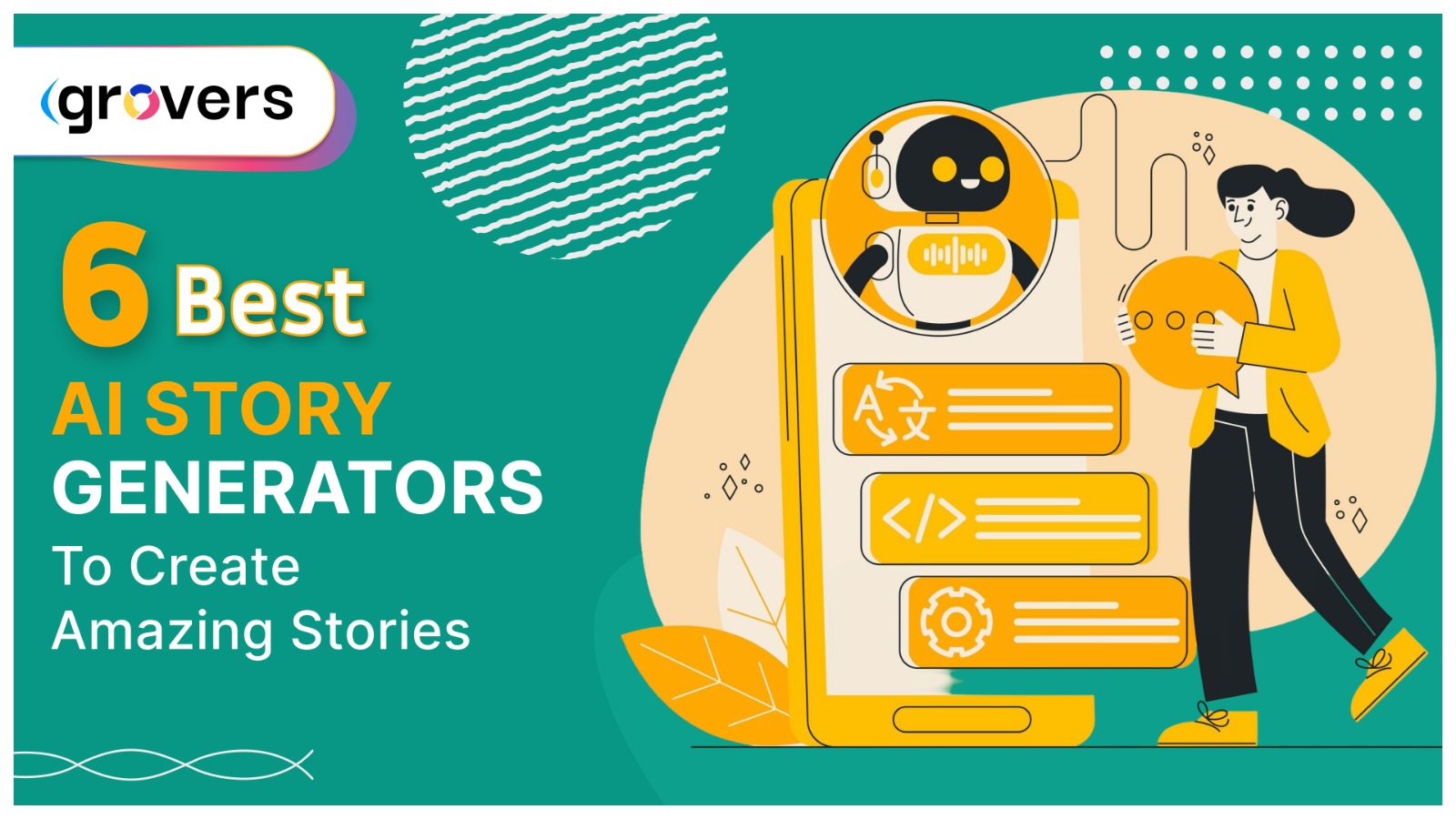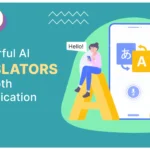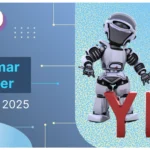Writer’s block affects 70% of writers at some point in their careers. Staring at a blank page for hours, struggling to find the perfect opening line, or getting stuck halfway through a plot. Those days are officially over. AI story generators have revolutionized creative writing. These tools can craft compelling narratives, develop characters, and even help you brainstorm plot twists in seconds. 89% of content creators now use AI tools to enhance their creative process.
But how do you pick the right AI story generator for your needs? Don’t worry, I have done the heavy lifting for you. I tested and compared the best AI story generator tools available in 2025 and documented my findings to help you choose the perfect writing companion. But before diving into individual tools, let’s understand the basics.
What is an AI Story Generator?
An AI story generator is a tool that uses artificial intelligence to create original stories, plotlines, characters, and dialogue based on your prompts or preferences. 83% of professional writers report that AI tools help them overcome creative blocks and increase productivity.
These tools work by analyzing millions of existing stories, understanding narrative patterns, character development, and storytelling techniques For example, when I needed to write a sci-fi short story last week, I used an AI story generator to:
- Create a unique alien civilization
- Develop compelling character backstories
- Generate plot twists I never would have thought of
- Write engaging dialogue between characters
There are different types of AI story generators depending on your needs.
Types of AI Story Generators You Should Know
Understanding the different types helps you pick the right tool for your specific writing goals.
Plot-Focused Generators
Plot-focused AI story generators excel at creating storylines, narrative arcs, and plot structures. These tools analyze thousands of successful stories to understand what makes plots engaging. Perfect for writers who have characters but struggle with what happens to them.
Character-Driven Generators
Character-driven generators specialize in creating detailed character profiles, backstories, motivations, and personality traits. They understand psychological depth and character development. Perfect for plot-driven writers who need help creating memorable, three-dimensional characters.
Dialogue Specialists
Dialogue-focused AI tools excel at creating natural conversations between characters. They understand speech patterns, personality quirks, and how different characters would realistically speak. Essential for screenwriters, novelists, and anyone writing character-heavy stories.
Genre-Specific Generators
Some AI story generators specialize in specific genres like fantasy, romance, mystery, or science fiction. They understand genre conventions, tropes, and reader expectations. Perfect when you want to write within established genre boundaries while still creating original content.
Let’s explore the best tools available right now.
Best AI Story Generator Tools of 2025
After testing dozens of AI story generators, reading user reviews, and analyzing features, I’ve narrowed it down to these top 6 tools.
| Tool | Average Rating | Price/Month | Word Limit | Genre Support | Best Feature |
| Jasper AI | 4.7/5 | $29 | 50,000 | All genres | Brand voice |
| Sudowrite | 4.8/5 | $19 | Unlimited | Fiction focus | Story engine |
| NovelAI | 4.6/5 | $15 | Unlimited | Fantasy/Sci-fi | Image generation |
| Squibler | 4.5/5 | Free | 2,000 | All genres | Book writing |
| ChatGPT | 4.4/5 | $20 | 4,000 | All genres | Versatility |
| Copy.ai | 4.3/5 | $36 | 25,000 | Marketing copy | Templates |
Let’s dive deep into each tool.
1. Jasper AI
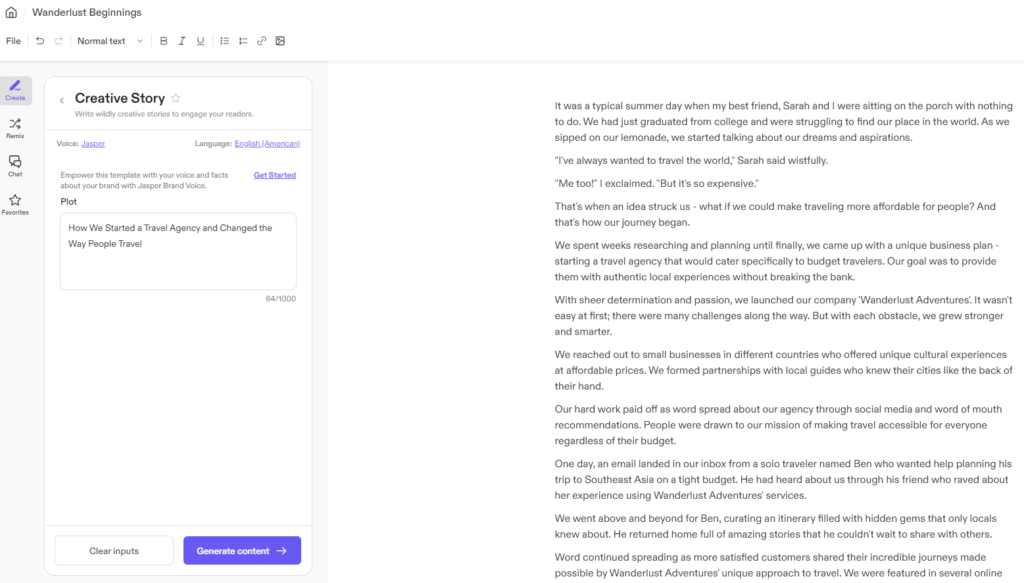
Jasper AI is a comprehensive AI writing platform that’s become the go-to choice for professional content creators and storytellers.
Features
- Brand Voice Recognition: Maintains consistent tone across all your stories
- Story Templates: 50+ pre-built story frameworks for different genres
- Character Development: Creates detailed character profiles and backstories
- Plot Generation: Develops compelling story arcs and narrative structures
- Dialogue Creation: Generates natural conversations between characters
- Content Expansion: Extends short prompts into full-length stories
- Multi-language Support: Writes stories in 25+ languages
- Plagiarism Checker: Ensures all content is original
Jasper AI excels at understanding your unique writing style and maintaining consistency across long-form content. The brand voice feature is game-changing. You can train Jasper to write in your specific tone, whether that’s humorous, dramatic, or mysterious.I used Jasper to write a 10,000-word fantasy novella. The AI maintained character voices perfectly throughout the entire story, something most other tools struggle with.
Jasper is highly scalable. Professional authors and content agencies use it for massive writing projects.
| Pros | Cons |
| Excellent brand voice consistency | More expensive than competitors |
| Professional-grade output quality | Learning curve for advanced features |
| Extensive template library | Overkill for casual writers |
| Superior customer support | |
| SEO optimization features |
After using Jasper for three months, I can confidently say it’s the most professional AI story generator available. The output quality rivals human writing, and the brand voice consistency is unmatched. Perfect for serious writers, content marketers, and anyone who needs high-quality, consistent storytelling at scale.
For more details you can also read the blog:
8 Best AI Blog Writer Tools for Human Like Content
2. Sudowrite
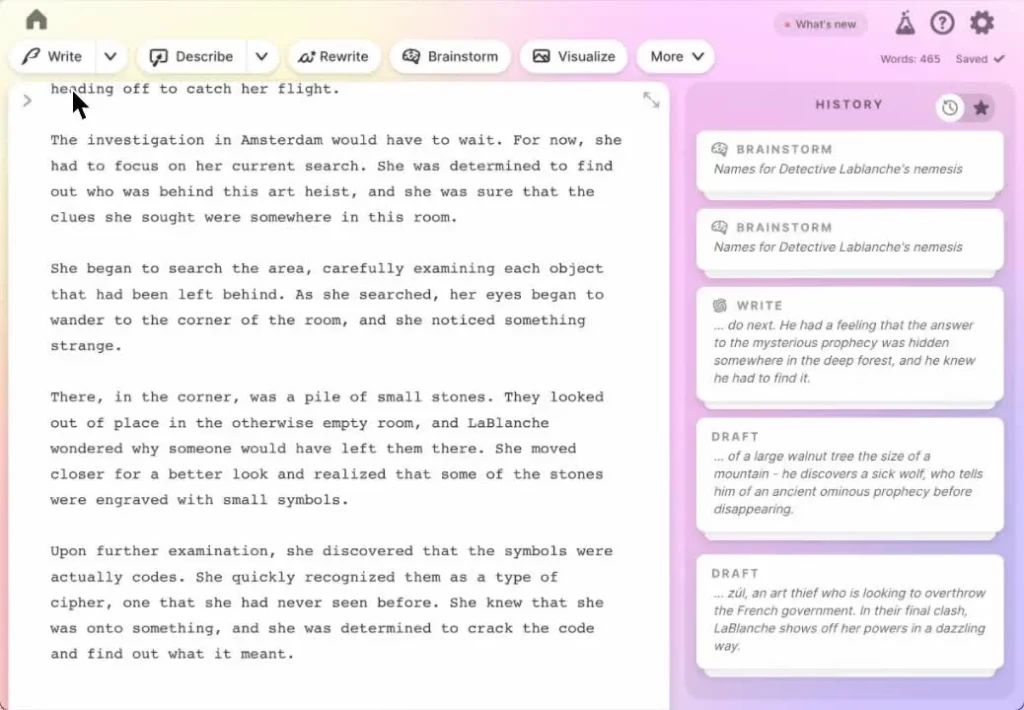
Sudowrite is specifically designed for fiction writers. It’s like having a creative writing partner who never gets tired of brainstorming.
Features
- Story Engine: Guides you through the entire story development process
- Character Sheets: Creates detailed character profiles with motivations and flaws
- Plot Hole Detection: Identifies inconsistencies in your narrative
- Prose Enhancement: Improves sentence structure and word choice
- Scene Building: Develops vivid, engaging scene descriptions
- Dialogue Polishing: Refines conversations to sound natural
- Genre Expertise: Understands conventions for mystery, romance, sci-fi, and more
- Feedback System: Provides constructive criticism on your writing
Sudowrite’s Story Engine is revolutionary. It walks you through character creation, plot development, and scene writing in a structured, logical way. The tool understands storytelling fundamentals better than any other AI generator I have tested. I used Sudowrite to develop a mystery novel. The AI helped me plant clues, develop red herrings, and create a satisfying resolution that I never could have thought of alone. Sudowrite scales well for both hobbyist writers and professional authors working on multiple projects.
| Pros | Cons |
| Fiction-focused features | Not ideal for non-fiction |
| Story Engine guidance system | Limited free trial |
| Excellent prose improvement | Can be overwhelming for beginners |
| Plot hole detection | |
| Strong community support |
Sudowrite is hands-down the best AI story generator for fiction writers. The Story Engine feature provides structure that many writers desperately need, while still allowing creative freedom. If you’re serious about writing novels, short stories, or screenplays, Sudowrite is worth every penny.
3. NovelAI
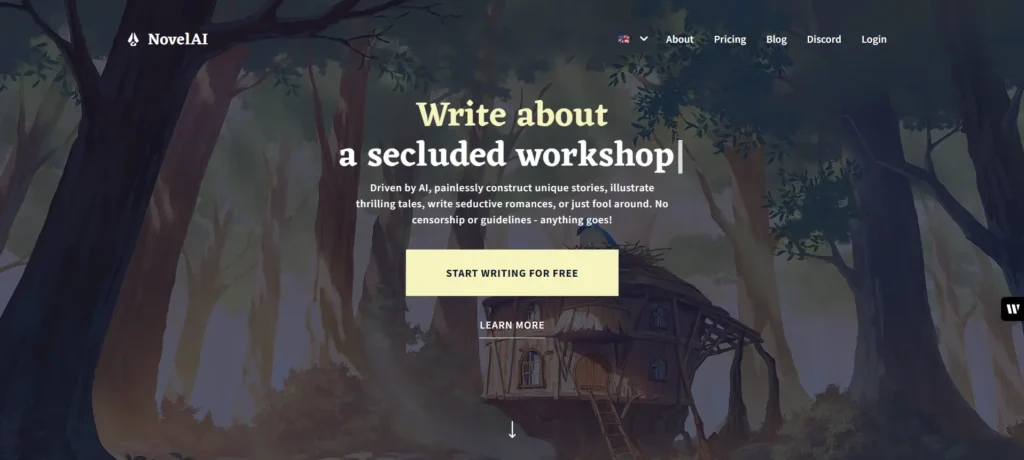
NovelAI started as a tool for interactive fiction but has evolved into a powerful story generator with unique features you won’t find anywhere else.
Features
- AI Image Generation: Creates illustrations for your stories
- Interactive Storytelling: Lets you make choices that affect the narrative
- Memory System: Remembers characters and plot points across long stories
- Style Mimicking: Writes in the style of famous authors
- Adventure Mode: Creates choose-your-own-adventure style stories
- Lorebook: Maintains consistency for world-building elements
- Custom AI Training: Train the AI on your writing samples
- Genre Specialization: Excels at fantasy, sci-fi, and adventure stories
NovelAI’s image generation feature sets it apart. You can create illustrations for your characters, scenes, and story elements. The interactive storytelling mode is addictive. You start with a premise, and the AI responds to your choices, creating branching narratives.I spent hours creating an interactive fantasy adventure. The AI remembered every character detail and plot point, creating a cohesive experience across thousands of words. NovelAI offers the most affordable unlimited writing option in the market.
| Pros | Cons |
| Affordable unlimited writing | Less polished interface |
| Image generation included | Learning curve for new users |
| Strong world-building features | |
| Community-driven development | |
| Interactive storytelling mode | |
| Excellent fantasy/sci-fi output |
NovelAI offers incredible value for money. The combination of unlimited writing, image generation, and interactive features makes it perfect for creative writers who want to experiment.It is ideal for fantasy and sci-fi writers, RPG creators, and anyone interested in interactive storytelling.
4. Squibler
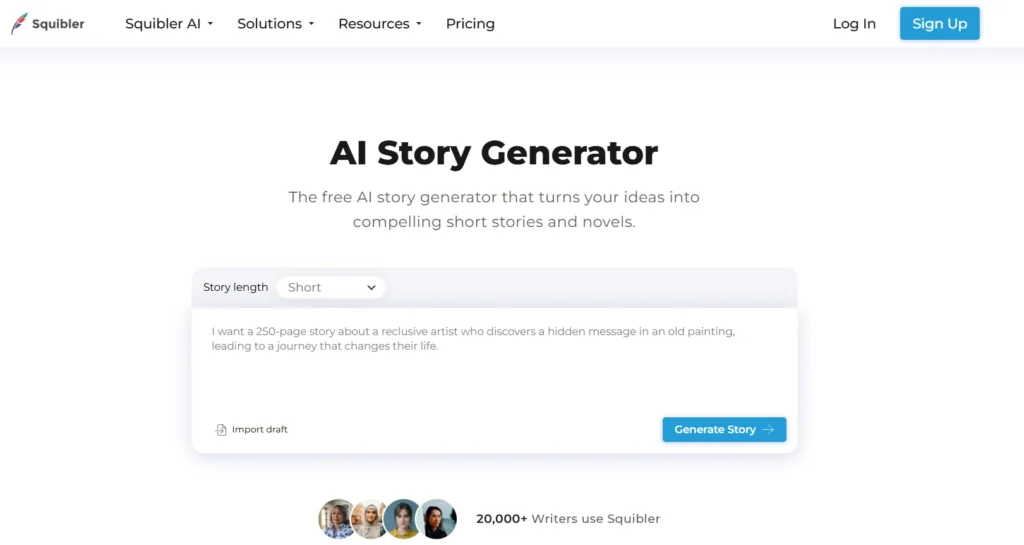
Squibler positions itself as the complete book writing platform with AI assistance. It’s designed for authors who want to write entire books, not just short stories.
Features
- Book Writing Assistant: Guides you through the entire book creation process
- Chapter Organization: Structures your book with proper formatting
- Character Database: Maintains detailed character information
- Plot Timeline: Tracks your story chronologically
- Research Tools: Helps you fact-check and research story elements
- Collaboration Features: Work with co-authors or editors
- Publishing Integration: Export to popular publishing platforms
- Free Version: 2,000 words per month at no cost
Squibler’s strength lies in its book-focused approach. Everything is designed around the assumption that you’re writing a full-length work. The character database and plot timeline features help maintain consistency across long narratives.I used Squibler to write a 80,000-word novel. The platform kept track of every character detail and plot point, making revisions much easier. Squibler scales from hobbyist to professional author needs effectively.
| Pros | Cons |
| Generous free plan | Limited AI creativity compared to competitors |
| Book-focused features | Interface can feel cluttered |
| Great organization tools | Fewer genre-specific features |
| Collaboration support | Publishing integration |
Squibler is the best choice for writers who want to complete full-length books. The organizational features and free plan make it accessible to writers at any level. Perfect for first-time authors, self-publishers, and anyone working on long-form projects.
5. ChatGPT
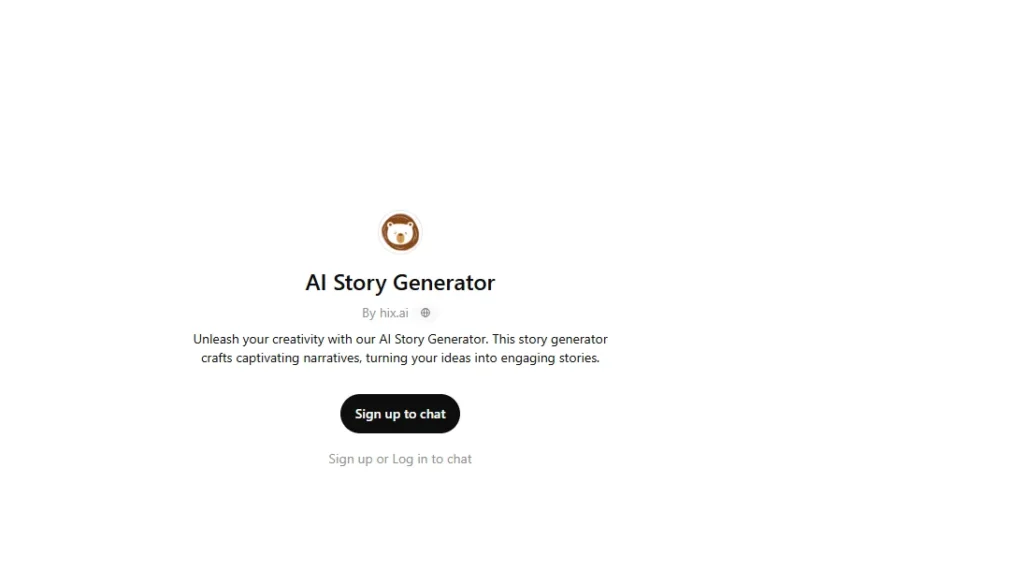
ChatGPT isn’t specifically designed for story writing, but its versatility and accessibility make it a popular choice for creative writers.
Features
- Conversational Interface: Natural dialogue with the AI
- Multi-turn Conversations: Maintains context across long interactions
- Prompt Engineering: Responds well to detailed creative prompts
- Genre Flexibility: Handles any writing style or genre
- Research Assistance: Helps with fact-checking and background research
- Editing Support: Provides feedback on existing writing
- Custom Instructions: Remembers your preferences and writing style
- Plugin Ecosystem: Extends functionality with third-party tools
ChatGPT’s strength is its conversational nature. You can brainstorm ideas, ask for feedback, and iterate on concepts naturally. The tool excels at understanding context and maintaining consistency within single conversations. I regularly use ChatGPT to overcome writer’s block. The conversational format helps me explore ideas without the pressure of formal writing.
Pricing and Scalability
- Free Plan: Limited daily usage with GPT-3.5
- Plus Plan: $20/month for GPT-4 access and priority
- Team Plan: $25/user/month for business features
ChatGPT offers excellent value, especially considering its versatility beyond just story writing.
| Pros | Cons |
| Most accessible AI tool | Not specifically designed for stories |
| Excellent conversational interface | Limited formatting options |
| Great value for money | Daily usage limits on free plan |
| Versatile beyond just writing | Strong research capabilities |
ChatGPT is the Swiss Army knife of AI writing tools. While not the best dedicated story generator, its accessibility and versatility make it valuable for any creative writer. Perfect for beginners, budget-conscious writers, and anyone who wants one tool for multiple creative tasks.
6. Copy.ai
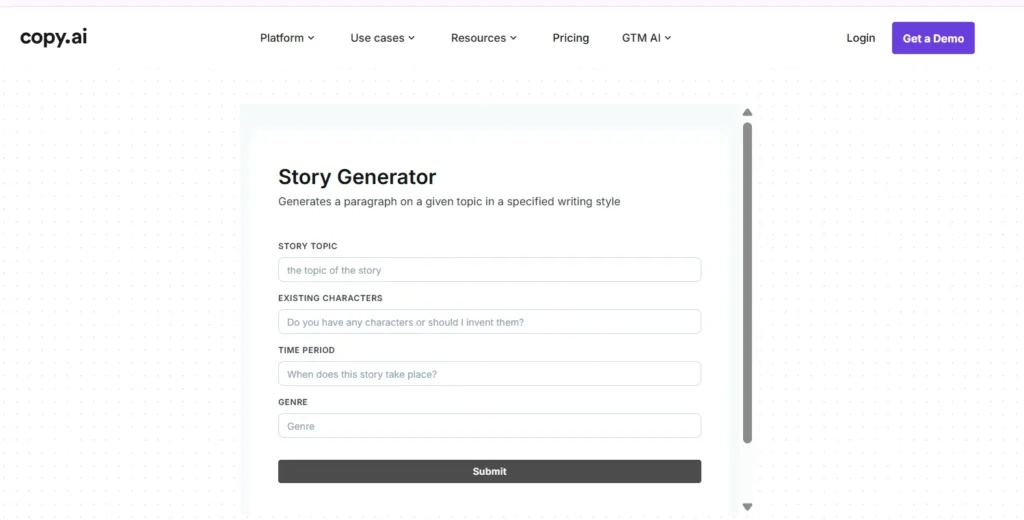
Copy.ai focuses primarily on marketing copy but includes story generation features that work well for certain types of creative writing.
Features
- Story Templates: Pre-built frameworks for different story types
- Marketing Focus: Excels at promotional storytelling
- Brand Story Creation: Develops compelling brand narratives
- Social Media Stories: Creates engaging content for platforms
- Email Storytelling: Crafts narrative-driven marketing emails
- Product Stories: Turns features into compelling narratives
- Customer Success Stories: Develops case study narratives
- Workflow Automation: Integrates with marketing tools
Copy.ai shines when you need stories for business purposes rather than pure creative writing.
The template library includes story formats specifically designed for marketing, which traditional story generators don’t offer. I used Copy.ai to create customer success stories for a SaaS company. The AI understood how to structure narratives that both told a story and drove business results. Copy.ai is positioned as an enterprise solution with pricing to match.
| Pros | Cons |
| Excellent for business storytelling | Expensive for creative writing use |
| Strong template library | Limited pure fiction capabilities |
| Marketing integration features | Not ideal for long-form content |
| Team collaboration tools | |
| Automation capabilities |
Copy.ai is the best choice if you need storytelling for business purposes. For pure creative writing, there are better and more affordable options available. It is perfect for marketers, business owners, and content creators who need story-driven copy that sells.
Competitor Analysis: What Sets These Tools Apart
The AI story generator market has distinct segments serving different user needs.
| Feature | Jasper AI | Sudowrite | NovelAI | Squibler | ChatGPT | Copy.ai |
| Fiction Focus | ⭐⭐⭐⭐ | ⭐⭐⭐⭐⭐ | ⭐⭐⭐⭐⭐ | ⭐⭐⭐⭐ | ⭐⭐⭐ | ⭐⭐ |
| Business Stories | ⭐⭐⭐⭐⭐ | ⭐⭐ | ⭐⭐ | ⭐⭐ | ⭐⭐⭐⭐ | ⭐⭐⭐⭐⭐ |
| Ease of Use | ⭐⭐⭐⭐ | ⭐⭐⭐ | ⭐⭐⭐ | ⭐⭐⭐⭐ | ⭐⭐⭐⭐⭐ | ⭐⭐⭐⭐ |
| Value for Money | ⭐⭐⭐ | ⭐⭐⭐⭐ | ⭐⭐⭐⭐⭐ | ⭐⭐⭐⭐⭐ | ⭐⭐⭐⭐⭐ | ⭐⭐ |
| Advanced Features | ⭐⭐⭐⭐⭐ | ⭐⭐⭐⭐⭐ | ⭐⭐⭐⭐ | ⭐⭐⭐ | ⭐⭐⭐ | ⭐⭐⭐ |
Professional writers gravitate toward Jasper AI and Sudowrite for their advanced features and output quality. Budget-conscious users prefer NovelAI and Squibler for their generous free plans and affordable pricing.Business users find Copy.ai’s marketing focus valuable, while casual writers appreciate ChatGPT’s accessibility and versatility.
Choosing Your Perfect AI Story Generator
Your choice depends on your specific writing goals, budget, and experience level.
For Professional Fiction Writers
Recommendation: Sudowrite
- Story Engine provides professional guidance
- Fiction-focused features and understanding
- Excellent prose improvement tools
For Business Storytelling
Recommendation: Jasper AI
- Brand voice consistency across campaigns
- Professional-grade output quality
- Marketing integration capabilities
For Budget-Conscious Writers
Recommendation: NovelAI
- Unlimited writing for $15/month
- Image generation included
- Strong fantasy/sci-fi capabilities
For Complete Beginners
Recommendation: ChatGPT
- Most accessible interface
- Excellent for brainstorming and learning
- Great value with versatile applications
For Book Authors
Recommendation: Squibler
- Book-focused organizational features
- Generous free plan to start
- Publishing platform integration
Advanced AI Story Writing Techniques
Getting the most from AI story generators requires understanding how to craft effective prompts and use advanced features.
Prompt Engineering for Better Stories
The quality of your output depends heavily on the quality of your input. Effective prompts include:
- Specific genre and tone instructions
- Detailed character descriptions
- Clear scene setting and atmosphere
- Desired story length and structure
Instead of: “Write a story about a detective.”Try: “Write a 2,000-word noir mystery about a cynical private detective in 1940s Los Angeles investigating the murder of a wealthy socialite. The tone should be dark and atmospheric with snappy dialogue.“
Using AI as a Collaborative Partner
The best results come from treating AI as a writing partner rather than a replacement. Start with AI-generated ideas, then add your own creativity, personal experiences, and unique perspective. This approach combines the AI’s ability to generate ideas quickly with your human insight and emotional understanding.
Iterative Improvement Process
Don’t expect perfect results on the first try. Use this iterative process:
- Generate initial content with basic prompts
- Identify strengths and weaknesses in the output
- Refine prompts with more specific instructions
- Add human creativity to improve characterization and emotion
- Use AI again to polish and expand the improved version
The Future of AI Story Generation
AI story generation technology continues advancing rapidly. Current developments include:
- Improved Character Consistency: Next-generation tools will maintain character voices, personalities, and development arcs across longer works with human-level consistency.
- Genre-Specific Intelligence: AI models trained specifically on romance, mystery, or science fiction will understand genre conventions and reader expectations better than general-purpose tools.
- Visual Storytelling Integration: You can expect tighter integration between text and image generation, creating complete multimedia storytelling experiences.
- Collaborative Writing Features: Advanced tools will support real-time collaboration between human writers and AI, with seamless handoffs and shared creative control.
- Personalized Writing Style Learning: AI will better understand and replicate individual author voices, making it easier to maintain consistency across multiple projects.
Performance Tips for AI Story Writing
Getting optimal results requires understanding each tool’s strengths and working within its capabilities.
- Start with Strong Prompts
Invest time crafting detailed, specific prompts. Include genre, tone, character details, setting, and desired outcome. The more context you provide, the better the results.
- Use AI for Initial Drafts
Let AI handle the heavy lifting of first drafts, then apply your human creativity to add emotional depth, personal experiences, and unique perspectives.
- Maintain Creative Control
Don’t let AI make all the creative decisions. Use its output as raw material that you shape, edit, and improve with your own vision.
- Experiment with Different Tools
Each AI has strengths in different areas. Use Sudowrite for fiction development, ChatGPT for brainstorming, and NovelAI for world-building.
- Save and Version Your Work
Always keep multiple versions of AI-generated content. Sometimes an earlier version contains better ideas than the “improved” later draft.
FAQs
Can AI story generators replace human writers?
AI story generators are useful tools that aid in the creative process but can never substitute for the human factors that give stories their power – personal experience, emotional resonance, cultural knowledge, and individual viewpoint. They are best used as collaborative partners, not substitutions.
Are AI-generated stories copyrightable?
Existing copyright legislation is changing when it comes to AI-generated material. The majority of legal scholars indicate that tales need considerable human imagination and rewriting to be protected by copyright. Inexorably include significant human contribution to any AI-written work you intend to release.
Which AI story generator is best for beginners?
ChatGPT is the easiest for beginners because of its chat format and cross-platform functionality. Squibler has a great free option that’s ideal for new writers finding their voice. Both have gradual learning curves with less-than-overwhelming features.
How much do AI story generators cost?
Costs range from free (ChatGPT basic, Squibler free plan) to $129/month (Sudowrite Max plan). Most writers find good value in mid-tier plans like NovelAI Scroll ($15/month) or Sudowrite Hobby ($19/month). The best choice depends on your usage volume and feature needs.
Can AI story generators write full novels?
Yes, there are some tools that can assist in writing full novels. Squibler is meant for writing books, whereas Sudowrite’s Story Engine will walk you through the whole novel-making process. NovelAI provides unlimited writing for long projects. Still, human monitoring and editing are necessary for high-quality outputs.
Conclusion
AI narrative generators have changed writing as an isolated battle with empty pages to a collective effort with smart partners. Whether you’re a professional writer wanting to boost productivity, a business owner seeking engaging brand narratives, or an enthusiast venturing into creative writing, there’s an AI tool with your budget and requirements.
The secret is to select the appropriate tool for your particular needs and to learn to work with AI as a creative collaborator instead of a substitute for human imagination. Begin with the free plans, try out various methods, and discover the AI story generator which brings out your distinctive creative voice.
